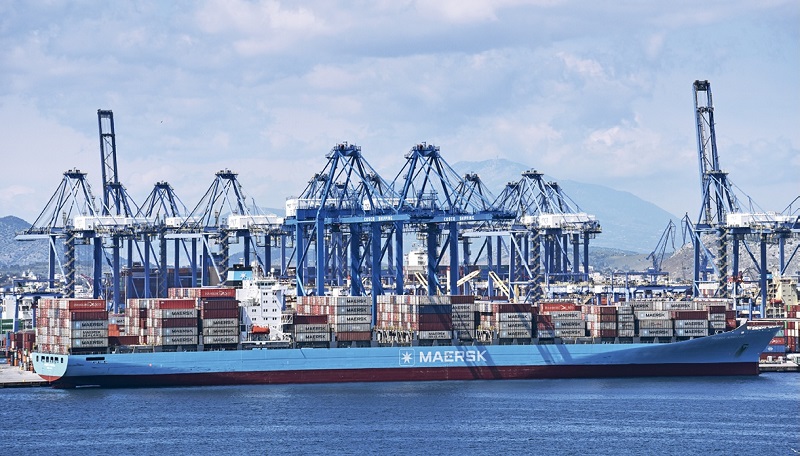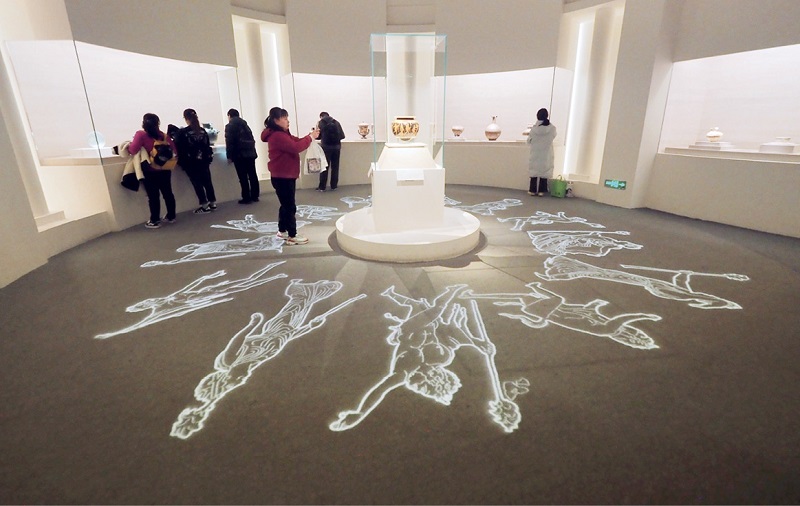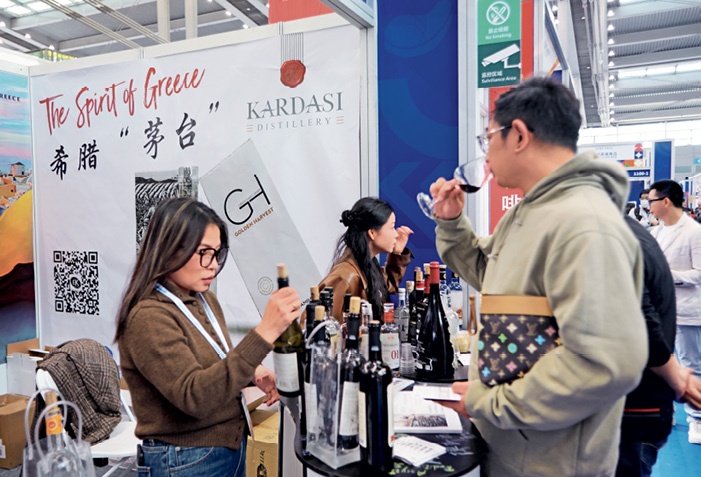The close ties between Greece and China, two ancient nations and modern states, as well as inheritors of two great civilizations, can be a catalyst for better China-EU relations and a more prosperous and stable global landscape.

China COSCO Shipping Corporation’s container terminal in Greece’s Piraeus port on April 10, 2025.
As we celebrate the 50th anniversary of China-EU relations established in May 1975, it is worthwhile to focus on the historical importance of our common ties that bring together China and European countries. This historic milestone marks both a cause for remembrance of past achievements and a point for the future upgrade of cooperation in a volatile global landscape. EU-China relations are essential to global peace, security and prosperity. The EU can greatly benefit from a pragmatic stance based on realism and the value of fruitful engagement with China. Over the past five decades, China-EU cooperation has come a long way at all levels. The amount of bilateral trade has soared from US $2.4 billion to US $780 billion, on average over €1.5 billion a day, while investment has increased from almost zero to US $260 billion. Today, the economies of China and the EU make up over one-third of the world economy. Cooperation in culture and academic exchanges, addressing climate concerns and ocean governance is proceeding. New geopolitical challenges require extended cooperation based on the principles of mutual respect, clear positions, a stable cooperation framework, and multilateralism to create points of unifying consensus. In this context of dynamic interaction between China and the EU, Greece has a special place, both a gateway into EU and as a member of Central and Eastern Europe.

Visitors viewing ancient Greek artifacts at the exhibition "The Countless Aspects of Beauty in Ancient Art" at the National Museum of China on December 5, 2024.
Greece is a unique country among European states. Greece is the birthplace of Western civilization with majestic contributions to history, culture, and technical civilization. Greece and China are the two most ancient nations in the world with a continuous, uninterrupted history, featuring the two most ancient languages still spoken and written today. Greece, strategically located on the geographical junction of Europe, Asia, and Africa, is the world’s largest ship-owning country, with a rich tradition of maritime activities. Greece with its unique and advantageous geographical position is a focal part of the Belt and Road Initiative (BRI), and especially the 21st Century Maritime Silk Road. Greece features multiple geopolitical identities, the Euro-Atlantic dimension being a European Union member (in the EU there are two ethnic Greek states including Cyprus), the Eurasian dimension being a member of the BRI and the Central and Eastern European Countries (CEEC) platform, and various regional identities with a focus on the Mediterranean Sea. Greece aspires to function as a “bridge-state” between the West and the East, between Europe and China. Greece with its coastal position is the gateway to Central and Eastern Europe and a pioneering state in forming synergies with China. Greece actively supports an independent EU policy and framework of relations with China.
On a diplomatic level, China and Greece share excellent relations since their official establishment in 1972. Greece actively supports the one-China policy and always promotes the principle of territorial integrity, non-interference and mutual respect. In 2006, the two countries begun the trajectory of advancing bilateral relations by signing a comprehensive strategic partnership. In this context, Greece upgraded its ties to China on multiple levels, reaping the benefits from its unique geopolitical position. In 2016, Greece became a member of the BRI and in 2019 joined the platform of Cooperation between China and CEEC. In the same year, Greece became a member of the Asian Infrastructure Investment Bank.
From an economic level, China has found in Greece, a strategically located country, a valuable gateway into the EU. China and Greece lay special emphasis on the maritime dimension of economic and technological ties. China is a global leader in shipbuilding, in import and export of goods and procuring for global supply chains. Greek ship owners are very dynamic in maritime industry, controlling 21 percent of the global fleet and 60 percent of the EU fleet. Maritime cooperation between China and Greece is an essential aspect of China-Greece excellent ties and future relations. In the context of the 21st Century Maritime Silk Road, ports like Piraeus are focal economic and logistics hubs in a global network. The Greek port of Piraeus is strategically located on the Suez Canal-Gibraltar shipping route, offering China access to the Black Sea and the Balkan hinterland towards Central and Eastern Europe through the railway system. Piraeus is an important gateway for China into the European markets. After cooperation with COSCO, now China COSCO Shipping Corporation, was established in the early 21st century, Piraeus has marked an impressive rise from the 17th busiest port in 2007 to the fourth busiest port in Europe in 2023 with a 271 percent rise in traffic. Piraeus has become the most important port in the Mediterranean, a focal point in Eurasian economic networks, and is poised to become a global-scale hub for economic flows.

Visitors at the 2024 World Food and Agricultural Expo (Shenzhen) enjoy tasting Greek wine on December 8, 2024.
Chinese President Xi Jinping has characterized the project as the “dragon head” of the Silk Road. The China-Europe Land-Sea Express line, starting from Piraeus, has reduced transport time up to 10 days for destinations in Central and Eastern Europe. This route functions in a complementary manner to another project, the continental China-Europe Railway Express. Thus, Piraeus has become a major European market entry port, dominating economic flows towards Eastern and Central Europe and the Black Sea region.
On a cultural level, Greece and China are two ancient nations and modern states-inheritors of two great civilizations that have formed the building blocks of the civilizations of Europe and Asia respectively and have had impact on a global scale with their timeless contributions to science, art, philosophy, ideas, and innovation. The bilateral cooperation is based on memoranda of cooperation, joint exhibitions, academic exchanges, and major international conferences. Venerable institutions, such as the Chinese Academy of Social Sciences, and many other Chinese universities have been essential in promoting cooperation with Greece in particular and the EU in general. Greece and China are both founding members of the Ancient Civilizations Forum.
As we celebrate the 50th anniversary of China-EU relations, we look with optimism towards a shared future of mutual respect, prosperity, and close diplomatic, economic, and cultural cooperation. We Europeans wish for a fruitful cooperation that shall safeguard our prosperity, regional stability, way of life and historical cultures, especially as new challenges have recently risen. The successful conclusion of a Comprehensive Agreement on Investment would be a clear sign of rebuilding trust and would greatly benefit bilateral trade and investment. We can resolve all pending issues and address the challenges of an increasingly complex world by strengthening our strategic communication and consultation, increasing cultural exchanges and joint projects to look to the next 50 years ahead. The famous British poet Rudyard Kipling once wrote, ‘‘Oh, East is East, and West is West, and never the twain shall meet.’’ With all respect to this great writer, the cooperation between China and the EU and more importantly, the future prospects of our common experience, certainly prove that assertions of the past have been superseded by a new dynamic spirit. China-EU cooperation can only be enhanced for mutual benefit and the creation of a more prosperous and stable global landscape during the next 50 years. 
IOANNIS E. KOTOULAS is a lecturer in geopolitics at the University of Athens and co-chair of the Modern Greek Studies Program of Southwest University (Chongqing).